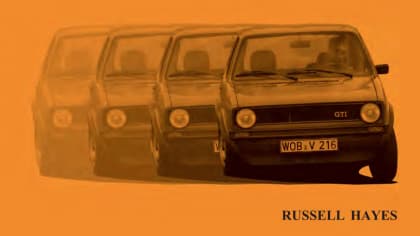IS YOUR CONVERTIBLE DAMAGING YOUR HEARING?
This article is from our archives and has not been updated and integrated with our "new" site yet... Even so, it's still awesome - so keep reading!
Published on Fri, Jan 21, 2011
By: The LACar Editorial Staff

Pete Townshend of the Who and LA CAR.
Yes, there is a connection. It’s widely known that Townshend has suffered some noise-induced hearing loss over the years. Not so widely known is that Townshend loves four-wheeled vehicles of every variety—everything from Ferraris to the Volkswagen microbus pictured here (Editor: he has a particular fondness for V-dubs). Alas, you won’t too many convertibles in his driveway. It turns out, that may be a good thing.
When it comes to noise-induced hearing loss, it’s not only rock n’ roll. Driving convertible automobiles with the top open at speeds exceeding 55 miles per hour may put drivers at increased risk of noise-induced hearing loss. That’s according to new research published in the Journal of Laryngology and Otology, by Cambridge University Press on behalf of JLO Ltd from the Saint Louis University School of Medicine, Missouri and The Ear Institute of Texas, San Antonio.
The research was carried out using five different makes and models of cars. Sound level measurements in 80 percent of the cars at 55 miles per hour with the top down had maximum sound recordings greater than 85 decibels. Exposure of noise above 85 dB for prolonged periods is not recommended, according to the USA-based National Institute of Occupational Safety and Health. Evidently, the higher the noise level, the shorter the recommended exposure time.
At 75 mph, the mean noise exposure inflicted on the driver of a convertible car driven with the top open was 89.9 decibels. Not only was the mean noise exposure excessive with the top open, but the driver was also exposed to extreme noise ‘spikes’ while driving on the highway; for example, when driving next to a motorcycle or lorry.
The study was undertaken using a sound level meter operated by a passenger in each car tested. The passenger took a series of between eight to ten sound level measurements at various points in the journey from the position of the driver’s left ear, at various speeds. During all data collection, the car radio was turned off, there was no conversation between occupants, air conditioning was turned off, the car horn was not used and there was no rain or other inclement weather.
Drivers of convertible automobiles may also be exposed to additional noise when listening to the car radio. Even for comfortable listening, the radio volume levels required while driving under the conditions assessed in this study are likely to add significantly to the noise exposure level.
During the study, no excessive noise levels were recorded from any tested car driven with the top closed, meaning there is no more than minimal risk of excessive noise exposure when driving with the convertible top closed.
“When the convertible automobiles were driven with the top open, high levels of noise were consistently recorded,” says Dr A A Mikulec from the Saint Louis University School of Medicine, who oversaw the study. “Although driving for short distances under such levels of noise exposure is unlikely to cause a significant degree of noise-induced hearing loss, our study demonstrates that long duration driving at high speeds with the convertible top open will increase the driver’s risk of hearing damage.”
“In light of the results of this study, we are recommending that drivers be advised to drive with the top closed when travelling for extended periods of time at speeds exceeding 85.3 kmph (Editor: this translates to roughly 53 miles per hour).”

To read more details of the report, go to: journals.cambridge.org/mikulec




